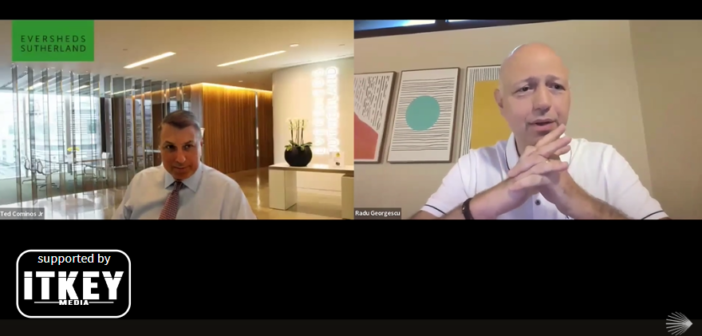- SeedBlink held an insightful webinar on communication strategies and pitfalls to avoid for startups
- The event took place online via Zoom on September 17th 2024
- The guest speaker was Ted Cominos Jr. of Eversheds Sutherland
On September 17th, the renowned Romanian co-investment platform SeedBlink hosted the webinar titled ‘How to avoid becoming uninvestable to a VC?’ It covered key communication strategies to keep a startup remain attractive in the eyes of venture capitalists and common pitfalls to avoid. The featured speaker at the webinar was Eversheds Sutherland’s partner Ted Cominos Jr.. and SeedBlink’s chairman of the board of directors Radu Georgescu was the moderator of the evening.
Speakers
 Ted Cominos Jr. is a partner at Eversheds Sutherland in Chicago, where he focuses on M&As, private equity, and corporate transactions. With over 20 years of experience, he provides legal counsel to both domestic and international clients, including private equity firms and public companies, on matters like joint ventures, restructurings, and asset sales. Prior to joining Eversheds Sutherland, Mr. Cominos was a partner at Faegre Drinker. His expertise spans complex corporate and financial transactions.
Ted Cominos Jr. is a partner at Eversheds Sutherland in Chicago, where he focuses on M&As, private equity, and corporate transactions. With over 20 years of experience, he provides legal counsel to both domestic and international clients, including private equity firms and public companies, on matters like joint ventures, restructurings, and asset sales. Prior to joining Eversheds Sutherland, Mr. Cominos was a partner at Faegre Drinker. His expertise spans complex corporate and financial transactions.

Radu Georgescu is a seasoned Romanian entrepreneur and investor with over 30 years of experience in the tech industry. He founded GeCAD Software in 1992 and achieved major success with exits like the sale of ePayment to Naspers and Vector Watch to Fitbit. He is the founding partner of Gecad Ventures and the chairman of the board of directors at SeedBlink.
Key Takeaways
- Importance of Team Structure: Mr Caminos emphasized that one of the most critical factors in making a business investable is how the management team is incentivized and structured. VC investors prioritize alignment within the team, ensuring that economic benefits are distributed well across the team to avoid power concentration in one individual.
- Pitfalls to Avoid in Team Management: Startups with a single dominant leader dictating all operations are less attractive to VCs. Mr Caminos underlined that a strong, complementary, and united team is far more valuable than just a brilliant idea with poor team dynamics.
- Legal Red Flags: Common legal issues, such as poorly documented intellectual property, incomplete cap tables, and hidden equity claims, are major deterrents for VCs. Entrepreneurs should be diligent in securing their IP rights and ensuring that all ownership agreements are formalized.
- Due Diligence and Preparation: VCs often go through hundreds of investment opportunities before narrowing down to a few that warrant deeper investigation. Only one in 20 businesses make it to the due diligence stage, highlighting the importance of thorough preparation before presenting to investors.
- Reps and Warranties: Mr Caminos highlighted the importance of Reps and Warranties – contractual statements that hold the entrepreneur accountable for their claims. Entrepreneurs should anticipate these in the later stages of negotiation, as VCs expect them to safeguard their investment.
- Challenges with Valuation: Many entrepreneurs mistakenly believe that achieving a high valuation guarantees success. However, Mr Caminos warned that complex terms and preferred shares, which prioritize VCs during exits, can erode an entrepreneur’s actual financial outcome, despite an impressive valuation on paper.
- Delaware Incorporation for Attracting US VCs: Mr Caminos recommended that European companies consider relocating their corporate structure to Delaware, which is favored by US investors due to its legal framework and governance standards.
- Preparation and Timing: Fundraising is a lengthy process, often taking from six months to a year. Mr Caminos stressed the importance of constant readiness, from keeping the pitch deck updated to ensuring legal compliance, to ensure the smoothness of the fundraising process and increase chances of success.
Insights Based on Numbers
- 1 in 20: Only one out of 20 companies that enter the due diligence stage get a term sheet. This emphasizes how critical preparation is for entrepreneurs, as the window of opportunity to secure VC funding is quite narrow.
- 50% conversion rate: Even after receiving a term sheet, only 50% of startups proceed to finalize the investment deal. The term sheet marks an important milestone but does not guarantee funding, making post-term sheet negotiation crucial.
- Over 100 companies reviewed: For every investment made, VCs typically review more than 100 companies, which illustrates the competitive nature of the fundraising process.
You are welcome to watch the full recording of the webinar here.

Kostiantyn is a freelance writer from Crimea but based in Lviv. He loves writing about IT and high tech because those topics are always upbeat and he’s an inherent optimist!





